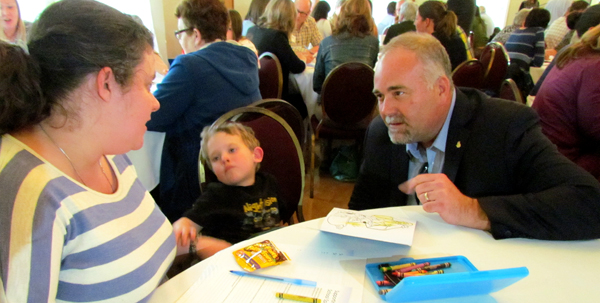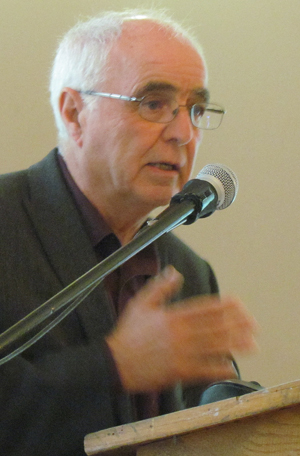Rural and remote education consultations ‘too little, too late’ for County schools
Sue Capon | May 13, 2017 | Comments 1

Kristie Fabian, with her son Alex, shares her concerns about drastic changes to the schools with Hastings Prince Edward MPP Todd Smith.
About 100 people concerned about school closures and drastic changes to the educational landscape made their way to West Lake Friday night for the second of 10 public consultations being held by the Ontario government to help shape the future of education in rural and remote Ontario.
The message from participants was clear: The consultation is too little, too late, and there should be a moratorium on school closings and amalgamations until recommendations from the consultations are prepared later this summer, and updated data is used in any discussions.
The final decisions for Hastings Prince Edward Counties schools are to be made at the school board meeting June 19. Jennifer Byford asked if decisions could be overturned following the consultations’ report release this summer.
“It’s too little, too late,” said Byford, a member of the Schools Accommodation Review Committee for Sophiasburgh. “This meeting should have happened months ago. If anything’s going to happen, it won’t happen for our schools. We’ve already had some very progressive conversations about offering community hubs at the school (allowing community use of school for fees) and the school board put out its proposal and none of it was touched upon. The whole process is extremely frustrating and it seems like none of our comments are being addressed.
The Liberal government’s road show “is a farce, a song and dance and a charade,” said Hastings Prince Edward MPP Todd Smith, who said it was insulting for people to be gathering on a Friday night, with short notice, far away from the affected schools.
“There’s a lot of people very angry about how this whole process has taken place. It’s a big decision for these communities. It’s not just a slap in the face, it’s a punch in the eyes for these communities that have serious issues with how this process has been rushed through and with outdated data.”
Smith said some bad press over potentially closing some 600 schools across the province, brought on the last-minute community consultations.
“Shame on the school board for not standing up to the ministry for the communities they represent,” said Smith, noting he will stand up in the legislature next week to speak about the people that came out on a Friday night to West Lake to stand up for their schools. “I hope it has some impact on the minister. And I do hope this has some impact on the school representatives here tonight. They know there’s options. The community has been presenting them. School boards elsewhere in the province have put their own moratoriums on school closures for one and two years.”
Smith agrees there are schools that should be closed because there are not enough students, but said decisions should be made using updated data, and with consultation and communication with municipal leaders who document their growth and sustainability plans. “None of that has been considered in this process.”
“I think the rush is the fact that there’s an election and the government is out of money. Leading into the last two elections, the Liberals said they were going to adjust the formula which was was unfair to school boards. After 2011 and 2014 they didn’t do it. And much like the health care system, the funding formula works in urban centres but it doesn’t work in rural communities. That’s part of the reason why we’re in the mess we’re in.”
A Rural and Remote Education Review was struck by Education Minister Mitzie Hunter last month with three parliamentary assistants appointed to lead 10 sessions for engagement and research gathering for “Ontario’s Rural Education Strategy”. Lou Rinaldi, MPP Northumberland Quinte West, is on the team.
The consultation, says Rinaldi, “will do a lot of good. We have to recognize low enrolment, and technology and that it’s hard to deliver programming to schools with 50, 60 or 100 kids… We’ve heard loud and clear that there’s been a lack of communication between school boards, trustees, parents, and community leaders.
“Most people understand that kids in today’s world with technology, need a school that can properly equip them to get these kids ready for the world of tomorrow. In many cases, that dialogue hasn’t happened. That is a purpose for tonight…The focus is how do we do things better tomorrow.”
A moratorium, he said won’t fix the issue.
“School board trustees are democratically elected to administer how schools operate. I hope tonight will help establish some policies to improve communication and secondly, find out through discussion, if anything was missed.”
Rinaldi said that if something of substance was to come out of the consultations, the government would not ignore it.
“I think there’s opportunity for that but I couldn’t speculate.” The door, he said is not fully open, but if “a real good idea was presented that would help the process, I think something could still be done. We want to make sure the kids get the best education possible. They want to have access to the best possible teaching and opportunities out there. That dialogue needs to happen.”
He said it’s no different than health care.
“We cannot have a University Avenue hospital in every small community. But we need something and we want to make sure that we have access to all the services.”
With enrolment down as much as 40 per cent in some schools, Rinaldi said business as usual is not possible. “But can we do a better job to allocate that space so the schools and kids could benefit as well? That is why we have a fairly short turn-around time, by July, to get a report back, maybe some new policies.”
Round table discussions focus on the following themes:
– What strategies work best for educating children in rural Ontario?
– How could the province improve its policy and funding levers to better support these objectives?
– What can be done to assist rural communities planning collaboratively and making the best use of public assets?
There were also representatives for organizations that serve the students at County schools.
Susan Quaiff, executive director of The Hub Child and Family Centre, said they are paying close attention because the changes directly affect how that organization structures its programs.
“We are concerned. Our footprints are in all those schools and we need to meet the needs of all the families out there with groups and before and after school care.”
Kristie Fabian was at a discussion table with her son Alex, who would have been starting school at Pinecrest in the fall, but potentially now will go to Queen Elizabeth School for one year, then Prince Edward Collegiate Institute the next year in a K-Grade 12 format.
“I’m overwhelmed by the process and how quick they are doing this,” said Fabian. “I don’t think they’ve given us enough information on the plan to amalgamate into the high school and how we will know our son will be safe there.”
Participants expressed they understand that not all schools can stay open, but were concerned decisions were being made by school boards fighting an insufficent funding formula for rural schools. The result, they said, goes beyond losing a school building and gaining long bus rides as it extends into the social and economic benefits of a community.
Ryan Aldred, also an ARC representative, said the people at his table realize the province is in a bind, “but speed kills. This process is deeply, deeply flawed,” noting to applause, that closures in the province should happen over years, not hundreds in one shot, and that communities that provide solutions, such as in Sophiasburgh’s community hub, should be heard.
The recommendations for the County:
Effective September, 2017, consolidate students from Pinecrest and Sophiasburgh schools at the Queen Elizabeth School site to form a kindergarten to Grade 6 school. Grade 7 and 8 students from those schools will attend PECI, creating a Grade 7 to 12 school.
Effective September 2018, PECI becomes a Kindergarten to Grade 12 school. “Renewal needs” at that school are estimated at $17.4 million. The need at each of the public schools assessed in 2011-2015 ranges from $1.8 million to $4.7 million.
CML Snider and Kente School consolidation is on hold until a report is done that includes Massassauga Rednersville school.
School boards receive the majority of their funding from the province based on enrolment and declining numbers challenges and cuts to funding. Roughly 15 per cent of students in Ontario’s publicly funded system are enrolled in rural school boards.
Consultations continue in Amherstburg, Honey Harbour, Thedford, Markstay, Markdale, Wawa and Nipigon.
The public is welcome to share opinions by June 9 online at https://www.ontario.ca/page/consultation-ontarios-rural-education-strategy or by emailing feedback and suggestions to information.met@ontario.ca
Filed Under: Featured Articles • Local News
About the Author:

































There is a better solution than sending rural children to urban settings. Bring those children to rural schools. If children in remote areas of this country ie: Cape Dorset can get an education then here in rural Ontario it should be very easy to do. Putting more students to gether in a smaller space and urban setting will create far more serious problems for society in the future. Smaller rural setting gives more oppourtunity for problem solving, creating long lasting friendships and a greater sense of belonging. Just this week two new families are relocating here from Missisauga. One student will attend Sophiasburgh Central in grade 7 and the other will enter PECI in grade 9. The movement by families is already from urban to rural. School boards need to be up to date with the lastest shift in demographics. Not the old 50 and 60 model where it was thought all oppourtunities were in a city. Money doe not always relate to a better life.